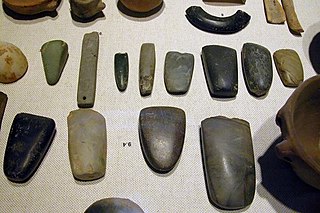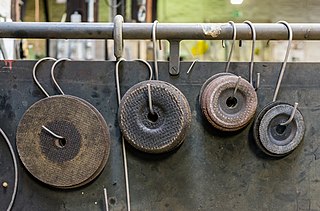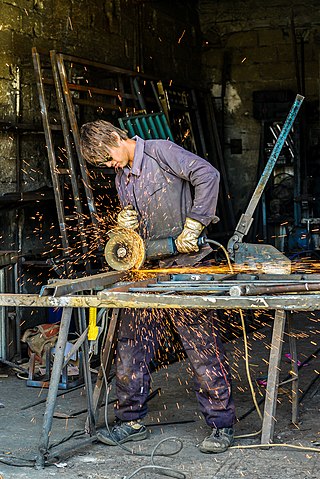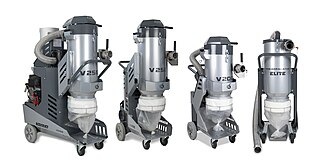
In archaeology, ground stone is a category of stone tool formed by the grinding of a coarse-grained tool stone, either purposely or incidentally. Ground stone tools are usually made of basalt, rhyolite, granite, or other cryptocrystalline and igneous stones whose coarse structure makes them ideal for grinding other materials, including plants and other stones.

Bihu is of three types and it is an important cultural festival unique to the Indian state of Assam – 'Rongali' or 'Bohag Bihu' observed in April, 'Kongali' or 'Kati Bihu' observed in October or November, and 'Bhogali' or 'Magh Bihu' observed in January. The festivals present an admixture of Tibeto-Barman, Austroasiatic and Indo-Aryan traditions entwined so intricately that it is impossible to separate them—festivals which are uniquely Assamese to which all communities of Assam had contributed elements. The Rongali Bihu is the most important of the three, celebrating spring festival. The Bhogali Bihu or the Magh Bihu is a harvest festival, with community feasts. The Kongali Bihu or the Kati Bihu is the sombre, thrifty one reflecting a season of short supplies and is an animistic festival.

A mortar and pestle is a set of two simple tools used to prepare ingredients or substances by crushing and grinding them into a fine paste or powder in the kitchen, laboratory, and pharmacy. The mortar is characteristically a bowl, typically made of hardwood, metal, ceramic, or hard stone such as granite. The pestle is a blunt, club-shaped object. The substance to be ground, which may be wet or dry, is placed in the mortar where the pestle is pounded, pressed, or rotated into the substance until the desired texture is achieved.

A file is a tool used to remove fine amounts of material from a workpiece. It is common in woodworking, metalworking, and other similar trade and hobby tasks. Most are hand tools, made of a case hardened steel bar of rectangular, square, triangular, or round cross-section, with one or more surfaces cut with sharp, generally parallel teeth. A narrow, pointed tang is common at one end, to which a handle may be fitted.

Horchata, or orxata, is a name given to various beverages, which are generally plant based, but sometimes contain milk. In Spain, it is made with soaked, ground, and sweetened tiger nuts. In some parts of the Americas, the base is jicaro, melon or sesame seeds, or white rice, along with other spices. Different varieties can be served hot or cold, and may be used as a flavor in other beverages, such as frappé coffee.

The Boro, also called Bodo, are a Tibeto-Burman speaking ethnolinguistic group native to the state of Assam in India. They are a part of the greater Bodo-Kachari family of ethnolinguistic groups and are spread across northeastern India. They are concentrated mainly in the Bodoland Territorial Region of Assam, though Boros inhabit all other districts of Assam and Meghalaya.

Sand casting, also known as sand molded casting, is a metal casting process characterized by using sand—known as casting sand—as the mold material. The term "sand casting" can also refer to an object produced via the sand casting process. Sand castings are produced in specialized factories called foundries. In 2003, over 60% of all metal castings were produced via sand casting.

Natural building or ecological building is a discipline within the more comprehensive scope of green building, sustainable architecture as well as sustainable and ecological design that promotes the construction of buildings using sustainable processes and locally available natural materials.

Grinding wheels are wheels that contain abrasive compounds for grinding and abrasive machining operations. Such wheels are also used in grinding machines.

Assamese cuisine is the cuisine of the Indian state of Assam. It is a style of cooking that is a confluence of cooking habits of the hills that favour fermentation and drying as forms of preservation and those from the plains that provide extremely wide variety of fresh vegetables and greens, and an abundance of fish and meat. Both are centred on the main ingredient — rice. It is a mixture of different indigenous styles with considerable regional variations and some external influences. The traditional way of cooking and the cuisine of Assam is very similar to South-East Asian countries such as Thailand, Burma (Myanmar) and others. The cuisine is characterized by very little use of spices, little cooking over fire, and strong flavours due mainly to the use of endemic exotic fruits and vegetables that are either fresh, dried or fermented. Fish is widely used, and birds like duck, pigeon, squab, etc. are very popular, which are often paired with a main vegetable or ingredient; beef used to be eaten before British colonialism, and some continue to do so. Preparations are rarely elaborate. The practice of bhuna, the gentle frying of spices before the addition of the main ingredients so common in Indian cooking, is absent in the cuisine of Assam. The preferred oil for cooking is the pungent mustard oil.

A belt sander or strip sander is a sander used in shaping and finishing wood and other materials. It consists of an electric motor that turns a pair of drums on which a continuous loop of sandpaper is mounted. Belt sanders may be handheld and moved over the material, or stationary (fixed), where the material is moved to the sanding belt. Stationary belt sanders are sometimes mounted on a work bench, in which case they are called bench sanders. Stationary belt sanders are often combined with a disc sander.
Jolpan, or snacks, are often served at breakfast in the cuisine of Assam, although they may also be served at Bihu festivals or weddings. The word jolpan includes all the preparations namely jolpan, pitha, laru and tea. Other common items served for breakfast may include roti, luchi, ghugni and sometimes paratha etc. Jolpan are also found in Bengal. The word literally derives from "water and betel leaf" but can mean any snack.

Grinding is a type of abrasive machining process which uses a grinding wheel as cutting tool.

A concrete grinder is an abrasive machine for grinding and polishing concrete and natural stone. Concrete grinders can come in many configurations, the most common being a hand-held general purpose angle grinder, but it may be a specialized tool for countertops or floors. Angle grinders are small and mobile, and allow one to work on harder to reach areas and perform more precise work.
In manufacturing, threading is the process of creating a screw thread. More screw threads are produced each year than any other machine element. There are many methods of generating threads, including subtractive methods ; deformative or transformative methods ; additive methods ; or combinations thereof.

An oscillating multi-tool or oscillating saw is a multitool and power tool that oscillates, powered by battery or mains. The name "multi-tool" is a reference to the many functions that this tool can perform with the range of attachments available. "Master Tool" is also a trade name used in North America, short for the original tool by Fein called the Multi-Master. Attachments are available for sawing, sanding, rasping, grinding, scraping, cutting, and polishing.

A mano is a ground stone tool used with a metate to process or grind food by hand. It is also known as metlapil, a term derived from Nahuatl.

Apo, apong, or poka is an alcohol drink commonly found among the Tani tribes in the Northeast India states of Arunachal Pradesh and Assam. It is prepared by fermentation of rice. It is known by various names across different tribes in Arunachal Pradesh and Assam.
Household stone implements in Karnataka, India used for wet grinding, dry grinding and pounding are oralu kallu, beeso kallu, dundagallu and kutni.
















